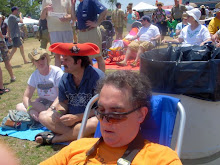Why Lawyers and Judges Don't Understand the Jury: Redux
Robert Williamson made the insightful comment:
"I didn't have a clue about the historic role of the jury or how juror's make decisions when I graduated from law school. Having an academic take the lead to design the "history" and "purpose" sections of the course makes sense for the reasons set forth in your post. The folks most conversant with the social science research and with how jurors make decisions, however, are not on law school faculties. Conflict of interest or no, they are trying cases or consulting on cases and any course that does not tap into that well of knowledge is likely to fall short of the mark I think you have in mind. I've pointed to your post on my blog, and I am looking forward to hearing more on this idea as you develop it. "
And for the most part, I agree. While a small number of legal academics are social scientists (such as Michael J. Saks and Neil Vidmar), they are by far the exception and not the rule. It is interesting that neither Saks or Vidmar have J.D. degrees; both did post-doctoral work at Yale Law School, where Saks received an M.S.L. degree, and where Vidmar performed a Law Fellowship.
Jury social scientists can be found in a variety of disciplines, including psychology, philosophy, criminology, sociology, and mathematics. Indeed, Thomas Munsterman, head of the NCSC Center for Jury Studies, is an engineer by training. And, like anything involving the social science, it can be assured that if you laid every one of these experts end to end, they still wouldn't reach a conclusion.
I am not so sure, however, that high-school students need to receive much training as to the social-science behind the jury. First, it can be pretty heady stuff. Secondly, alot of the social science has more to do with jury manipulation than performance.
Now, I do believe that law schools should offer courses on the social science of the jury system. Few do. The classes may be taught in psychology, political science or sociology departments, but clearly this is something lawyers are expected to know yet have no background in. We go by myth, anecdote, popular misconceptions, sheer luck, intuition, clues, hints, rumor, gossip and innuendo, not by a background in study and science.
Unfortunately, there is not even a decent law school textbook giving a broad overview of the social science of the jury system in an approachable and useful way. Nancy Marder's book The Jury Process and Randolph Jonakait's The American Jury System are the pick of the litter, but neither are written for this purpose. If someone wants to study this material, they can get snippets, read an occasional lengthy treatise which will cover one aspect, or research the law reviews.
What we have here is an institutional failure on the part of American legal educators to take the jury seriously. How many law professors have ever been successful trial lawyers? And if we take out those educators consigned to the less prestigious and influential clinical programs?


0 Comments:
Post a Comment
<< Home